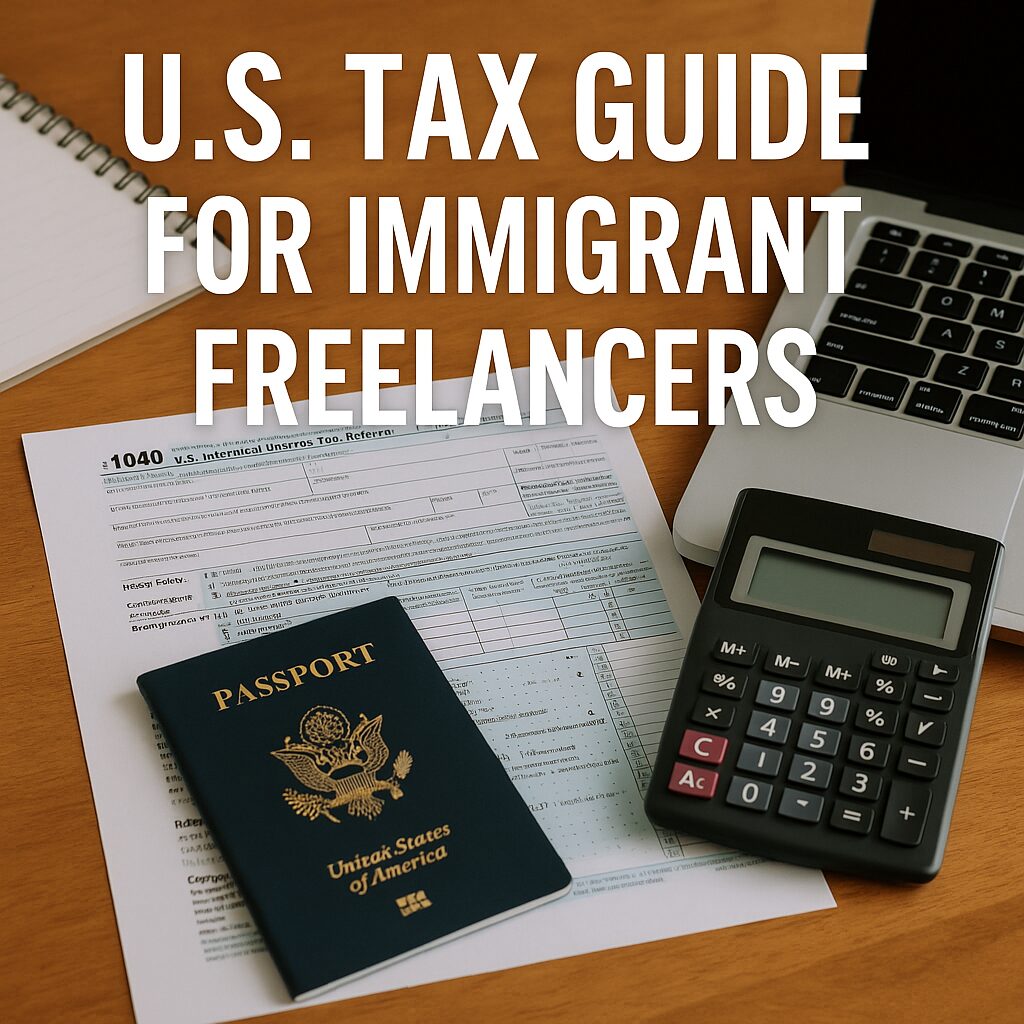Subtitle: Stay Compliant, Avoid Fines, and Keep Your Visa Safe
[Section 1: Why Immigrant Freelancers Must Take Taxes Seriously]
If you’re an immigrant or visa holder earning money through freelancing, content creation, or side hustles, tax filing is not optional — it’s essential.
Even if your visa doesn’t allow “work,” income often leads to tax obligations. And failure to report can trigger IRS fines, audits, or worse — immigration problems.
In this post, you’ll learn exactly how to file taxes as a non-citizen freelancer — step by step.
[Section 2: Who Needs to File Taxes in the U.S.?]
You must file taxes if:
- You earned any income while physically present in the U.S.
- You have a U.S.-registered LLC, even if you live abroad
- You received 1099 forms or income through U.S.-based platforms (e.g. Stripe, PayPal)
- You earned more than $400 in self-employment income
Even if you’re not a citizen or green card holder, you still have to report U.S.-sourced income.
[Section 3: Key Terms You Must Understand]
| Term | Meaning |
|---|---|
| ITIN | Individual Taxpayer Identification Number — needed if you don’t have an SSN |
| 1099-NEC | Form issued by U.S. companies if you earn $600+ through them |
| Self-Employment Tax | 15.3% tax on freelance/contract income |
| W-8BEN | Form to declare foreign status and reduce withholding |
| Schedule C | IRS form to report self-employment income & expenses |
[Section 4: Step-by-Step Tax Filing Process]
- Get an ITIN (if you don’t have SSN)
- Track your income and expenses using spreadsheets or apps (e.g. QuickBooks, Wave)
- Fill out IRS forms:
- Schedule C for business income
- 1040-NR (Nonresident return)
- Deduct eligible expenses (software, hosting, gear, etc.)
- Calculate & pay self-employment tax
- File state taxes if required
- Pay quarterly estimated taxes if income is ongoing
- Keep records for at least 3–5 years
[Section 5: What Happens If You Don’t File?]
- IRS penalties up to 25% of unpaid tax
- Immigration background checks may flag tax issues
- Visa renewal or adjustment can be denied
- Future green card/citizenship applications affected
- Bank accounts or PayPal may be frozen
👉 Bottom line: Don’t skip tax filing.
[Section 6: Common Mistakes Immigrant Freelancers Make]
- Not filing because “it’s just online money”
- Using personal bank accounts (no separation)
- Forgetting about state taxes
- Not deducting legal business expenses
- Failing to file W-8BEN when using U.S. platforms from abroad
[Section 7: International Tax Treaties – Can You Reduce Your Taxes?]
Some countries have tax treaties with the U.S.
These can reduce withholding or allow exemptions for certain income types.
- Use Form W-8BEN to claim treaty benefits
- Examples:
- India: May reduce freelance tax
- Korea: Allows exemption on student fellowships
- Germany: No double tax on royalties
Always check with a cross-border tax expert.
[Section 8: Tools That Make Filing Easier]
| Tool | Purpose |
|---|---|
| Sprintax | For international students and scholars |
| TurboTax | Popular self-filing option for freelancers |
| FreeTaxUSA | Budget-friendly DIY platform |
| Deel | Manages contractor payments globally |
| Tax Accountant | Best for high-income or complex cases |
[Section 9: Real Story – Minh’s $800 Mistake]
Minh, a digital designer on an F-1 visa, earned $2,000 through Etsy.
He didn’t report it, thinking it was “just a side gig.”
Later, when applying for OPT extension, the USCIS flagged his tax record.
He had to pay $800 in back taxes, plus a fine — and almost lost his work authorization.
Lesson: File your taxes, even for small amounts.
[Section 10: Final Thoughts – Protect Your Future by Filing Right]
You may not think of yourself as a “business,”
but the IRS does — and so does immigration.
Stay smart. Stay compliant.
By filing correctly and on time, you protect your income, your visa, and your future in the U.S.
